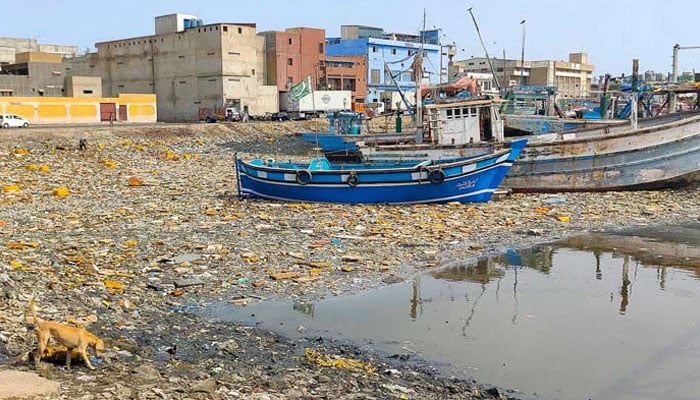‘Sepa to unveil strategy to combat marine pollution along city’s coastal belt’
The Sindh Environmental Protection Agency (Sepa) is set to unveil a comprehensive strategy aimed at combating marine pollution along Karachi’s coastal belt. The initiative seeks to safeguard marine life and coastal areas from the ongoing damage caused by the unchecked discharge of domestic and industrial effluents.
The newly appointed Sepa director general Waqar Hussain Phulpoto made this announcement during a round-table discussion on environmental governance in the province that was organised by the National Forum for Environment & Health (NFEH) at a hotel.
Phulpoto acknowledged the growing threat of marine and coastal erosion due to effluent discharge from industries, residential areas and the port. He stressed that under his leadership, Sepa is considering establishing a dedicated marine pollution control cell and deploying trained personnel to proactively mitigate coastal environmental degradation.
“The issue of marine pollution involves multiple stakeholders. Sepa will factor in the jurisdictional overlap between various civic, land-owning and municipal bodies, including the Karachi Metropolitan Corporation, which controls only a limited portion of the city, which often hinders environmental law enforcement.”
He made the assurance that Sepa has already initiated penal action against various civic and land-controlling agencies for their involvement in pollution and environmentally harmful practices. He said the agency is working to enhance its technical capacity to effectively monitor and assess air quality in urban centres.
Concerned environmental experts and civil society leaders present at the event underscored the urgency of improving environmental governance in Sindh. Senior environmental consultant Rafiul Haq stressed the importance of tailoring urban planting campaigns to the local climate, soil and land conditions to ensure long-term success.
Haq also called for strict enforcement of building by-laws to reduce the environmental footprint of new housing developments and ensure ample space for urban greenery. Senior environmental journalist Afia Salam highlighted that strict enforcement of existing environmental laws and policies in Sindh would play a vital role in addressing the region’s climate change challenges.
NFEH President Muhammad Naeem Qureshi emphasised the need for tighter regulation in industrial zones, calling on Sepa to crack down on the uncontrolled discharge of pollutants from factories, and initiate a province-wide campaign against harmful emissions from unfit motor vehicles.
Qureshi also stressed that environmental enforcement be expanded beyond Karachi to other urban and industrial centres across the province. NFEH General Secretary Ruqiya Naeem urged Sepa to regulate and guide planting campaigns to avoid the pitfalls of poor seasonal timing and unsuitable plant species.
-
 Kate Gosselin Reveals Horrowing Moment Thief Nearly Took Her Down
Kate Gosselin Reveals Horrowing Moment Thief Nearly Took Her Down -
 Billy Bob Thornton Weighs In On Contrast To 'Landman' Role
Billy Bob Thornton Weighs In On Contrast To 'Landman' Role -
 Amanda Holden May Swap Position To Different Reality Show: See Which
Amanda Holden May Swap Position To Different Reality Show: See Which -
 The Truth Behind Victoria Beckham's 'inappropriate' Wedding Dance Video
The Truth Behind Victoria Beckham's 'inappropriate' Wedding Dance Video -
 AI Startup Raises $480 Million At $4.5 Billion Valuation In Earlier Gains
AI Startup Raises $480 Million At $4.5 Billion Valuation In Earlier Gains -
 North Carolina Woman Accused Of Serving Victims With Poisoned Drinks
North Carolina Woman Accused Of Serving Victims With Poisoned Drinks -
 Robert Redford’s Daughter Amy Sings Praises Of Late Father
Robert Redford’s Daughter Amy Sings Praises Of Late Father -
 OpenAI And ServiceNow Team Up To Embed ChatGPT In Business Workflows
OpenAI And ServiceNow Team Up To Embed ChatGPT In Business Workflows -
 Johnny Depp Prepares For His Massive Comeback After Years Of Struggle
Johnny Depp Prepares For His Massive Comeback After Years Of Struggle -
 Meghan Markle Is Ready To Put A Cork In It All By Giving Prince Harry Baby No. 3: ‘She Wants A Break’
Meghan Markle Is Ready To Put A Cork In It All By Giving Prince Harry Baby No. 3: ‘She Wants A Break’ -
 Billie Eilish Speaks Out Against Authority: 'It's Very Strange'
Billie Eilish Speaks Out Against Authority: 'It's Very Strange' -
 'Greenland Will Stay Greenland', Former Trump Adviser Hints At New Twist
'Greenland Will Stay Greenland', Former Trump Adviser Hints At New Twist -
 Brooklyn Beckham's Wedding Dance With Mom Victoria Sparks Hilarious Memes
Brooklyn Beckham's Wedding Dance With Mom Victoria Sparks Hilarious Memes -
 King Charles' Latest Photos A Statement On His Health?
King Charles' Latest Photos A Statement On His Health? -
 Tom Cruise's Biggest Dream Crushed By The President?
Tom Cruise's Biggest Dream Crushed By The President? -
 King Charles, Queen Camilla Send Message To King Of Spain After Train Crash
King Charles, Queen Camilla Send Message To King Of Spain After Train Crash




